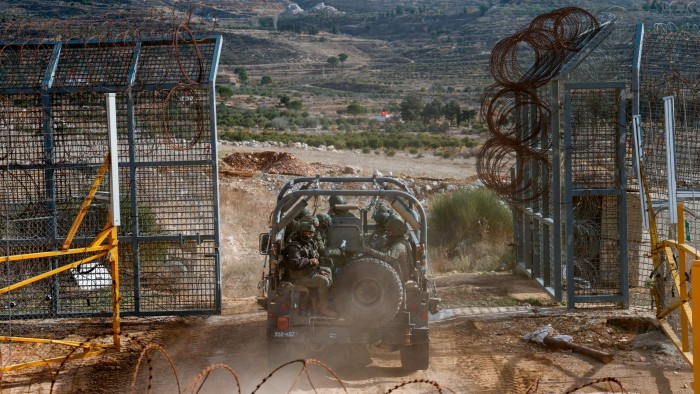Israel’s defence minister said the country wanted to create a “sterile defensive area” inside Syria after seizing territory and pounding military targets in the country following the collapse of president Bashar al-Assad’s regime.
In recent days, Israeli ground forces have crossed the border from the occupied Golan Heights into a previously demilitarised buffer zone inside Syria, seizing abandoned Syrian army positions.
Israel Katz on Tuesday said he and Prime Minister Benjamin Netanyahu had ordered the military “to establish a sterile defensive area free of weapons and terror threats in southern Syria” without a permanent Israeli presence.
His comments came after Israel launched air strikes across Syria, with the Israeli military saying it had struck most of the “strategic weapons stockpiles” in the Arab state.
Over the past 48 hours, Israeli fighter jets carried out more than 350 aerial strikes, while war ships struck Syrian naval bases at Al-Bayda and Latakia ports.
Katz said Israel had “destroyed” Syria’s modest navy “with great success”.
Israel’s strikes and incursions into Syria have been condemned internationally. Turkey’s foreign ministry on Tuesday that “Israel is again displaying its occupier mentality”.
Geir Pedersen, UN envoy to Syria, warned Israel risked damaging the chances of a peaceful transition in the fragile state.
“We need to see a stop to the Israeli attacks,” Pedersen said. “It’s extremely important that we don’t see any action from any international actor that destroys the possibility for this transformation in Syria to take place.”
Israel Defense Forces spokesperson Avichay Adraee on Tuesday denied reports the military had advanced towards the Syrian capital, Damascus, saying its troops “are present inside the buffer zone and at defensive points close to the border in order to protect the Israeli border”.
However, another Israeli military spokesperson acknowledged that while most of the ground force operations were inside the buffer zone, some troops had operated “beyond” the area.
The full extent of Israel’s incursion is difficult to estimate. The UN monitors who sit between the Israeli and Syrian positions in the zone, called the Alpha and Bravo Lines, have seen the IDF continue to move “men and material” since about December 7, said an international diplomat briefed on the situation.
That includes hundreds of soldiers, some armoured vehicles and excavation equipment, the person said. They added the Israeli troops have positioned themselves in or near seven abandoned Syrian military posts, and the local populations, mostly Druze, have remained in place.
“This is not in the scale of movement as you saw into southern Lebanon, and it’s not in what I imagine you would have if you were trying advance further,” the diplomat said.
Israel occupied most of the Golan Heights during the six-day war in 1967, but its claim over the land is not internationally recognised. Israeli ground troops last entered Syrian territory beyond the Golan Heights in the 1973 Arab-Israeli war.
Israel has for more than a decade launched air strikes in Syria, targeting Iran-affiliated weapons sites. Tehran and the militant groups it supports, including the Lebanon’s Hizbollah, deployed in Syria to back the Assad regime during the country’s civil war.
Netanyahu said in a press conference on Monday night that “control on the Golan Heights ensures our security; it ensures our sovereignty”.
“The Golan Heights will be an inseparable part of the state of Israel forever,” he added.
Israeli officials on Monday said air strikes had hit targets including remnants of Syria’s chemical weapons stockpiles.
A person familiar with developments in Syria said Israel had also struck what was left of the country’s air force, including grounded planes and helicopters.
The US, Israel’s biggest ally, backed its actions in Syria, describing the operations as “exigent operations to eliminate what they believe are limited threats”.
“We certainly recognise that they live in a tough neighbourhood and they have, as always, the right to defend themselves,” US National Security Council spokesperson John Kirby said on Tuesday.
The campaign came as Hayat Tahrir al-Sham, the Islamist rebel faction that led the offensive that ousted Assad, seeks to consolidate control of Syria amid fears the change of regime could fuel regional instability.
Mohamed al-Bashir, head of the Syrian Salvation Government, HTS’s de facto civilian administration in the northwestern province of Idlib, announced he would be leading a temporary caretaker government for all of Syria that would “maybe” end on March 1 next year.
The toppling of the Assad regime, which ruled Syria for 50 years, capped a lightning offensive by HTS that swept across the country in less than a fortnight.
As HTS took control of Damascus on Sunday, Assad escaped to Russia, the country that backed him in Syria’s 13-year civil war.
HTS leader Abu Mohammad al-Jolani pledged in a statement published on rebel-run social media channels to hold to account “the criminals, murderers and army and security officers involved in torture of the Syrian people”.
HTS has issued a general amnesty for conscripted members of the Assad military, while state bodies have ordered a resumption of public services and activity in the economically vital oil sector.
Fighters and Syrian civilians have also opened the Assad regime’s notorious prisons, releasing captives including political prisoners who had been incarcerated for decades and uncovering evidence of torture.
Additional reporting by Richard Salame in Beirut, Felicia Schwartz in Washington and Mehul Srivastava in London
Cartography by Steven Bernard
Read the full article here




